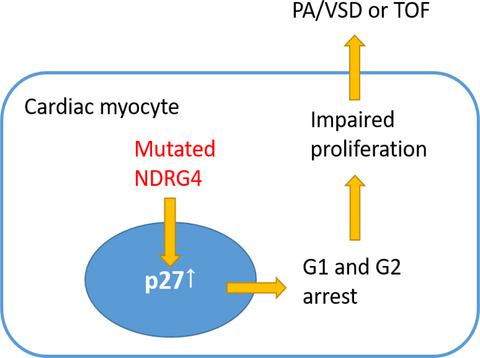当前位置:
X-MOL 学术
›
FEBS Open Bio
›
论文详情
Our official English website, www.x-mol.net, welcomes your
feedback! (Note: you will need to create a separate account there.)
A loss‐of‐function mutation p.T256M in NDRG4 is implicated in the pathogenesis of pulmonary atresia with ventricular septal defect (PA/VSD) and tetralogy of Fallot (TOF)
FEBS Open Bio ( IF 2.8 ) Pub Date : 2020-11-19 , DOI: 10.1002/2211-5463.13044 Jiayu Peng 1 , Qingjie Wang 1 , Zhuo Meng 1 , Jian Wang 1 , Yue Zhou 1 , Shuang Zhou 1 , Wenting Song 2 , Sun Chen 1 , Alex F Chen 3, 4 , Kun Sun 1
FEBS Open Bio ( IF 2.8 ) Pub Date : 2020-11-19 , DOI: 10.1002/2211-5463.13044 Jiayu Peng 1 , Qingjie Wang 1 , Zhuo Meng 1 , Jian Wang 1 , Yue Zhou 1 , Shuang Zhou 1 , Wenting Song 2 , Sun Chen 1 , Alex F Chen 3, 4 , Kun Sun 1
Affiliation

|
Pulmonary atresia with ventricular septal defect (PA/VSD) is a rare congenital heart disease (CHD) characterized by a lack of luminal continuity and blood flow from either the right ventricle or the pulmonary artery, together with VSDs. The prevalence of PA/VSD is about 0.2% of live births and approximately 2% of CHDs. PA/VSD is similar to tetralogy of Fallot (TOF) in terms of structural and pathological characteristics. The pathogenesis of these two CHDs remains incompletely understood. It was previously reported that N‐myc downstream‐regulated gene (NDRG)4 is required for myocyte proliferation during early cardiac development. In the present study, we enrolled 80 unrelated patients with PA/VSD or TOF and identified a probably damaging variant p.T256M of NDRG4. The p.T256M variant impaired the proliferation ability of human cardiac myocytes (hCM). Furthermore, the p.T256M variant resulted in G1 and G2 arrest of hCM, followed by an increase in p27 and caspase‐9 expression. Our results provide evidence that the p.T256M variant in NDRG4 is a pathogenic variant associated with impaired hCM proliferation and cell‐cycle arrest and likely contributes towards the pathogenesis of PA/VSD and TOF.
中文翻译:

NDRG4 中的功能缺失突变 p.T256M 与肺动脉闭锁伴室间隔缺损 (PA/VSD) 和法洛四联症 (TOF) 的发病机制有关
肺动脉闭锁伴室间隔缺损 (PA/VSD) 是一种罕见的先天性心脏病 (CHD),其特征是缺乏管腔连续性和来自右心室或肺动脉的血流以及 VSD。PA/VSD 的患病率约为活产的 0.2% 和大约 2% 的 CHD。PA/VSD 在结构和病理特征方面与法洛四联症 (TOF) 相似。这两种冠心病的发病机制仍不完全清楚。此前有报道称,N-myc 下游调节基因 (NDRG)4 是心脏发育早期心肌细胞增殖所必需的。在本研究中,我们招募了 80 名不相关的 PA/VSD 或 TOF 患者,并确定了 NDRG4 的一个可能具有破坏性的变异 p.T256M。p.T256M 变体损害了人心肌细胞 (hCM) 的增殖能力。此外,p.T256M 变异导致 hCM G1 和 G2 期阻滞,随后 p27 和 caspase-9 表达增加。我们的结果提供了证据,证明 NDRG4 中的 p.T256M 变异是一种与 hCM 增殖受损和细胞周期停滞相关的致病变异,并且可能有助于 PA/VSD 和 TOF 的发病机制。
更新日期:2020-11-19
中文翻译:

NDRG4 中的功能缺失突变 p.T256M 与肺动脉闭锁伴室间隔缺损 (PA/VSD) 和法洛四联症 (TOF) 的发病机制有关
肺动脉闭锁伴室间隔缺损 (PA/VSD) 是一种罕见的先天性心脏病 (CHD),其特征是缺乏管腔连续性和来自右心室或肺动脉的血流以及 VSD。PA/VSD 的患病率约为活产的 0.2% 和大约 2% 的 CHD。PA/VSD 在结构和病理特征方面与法洛四联症 (TOF) 相似。这两种冠心病的发病机制仍不完全清楚。此前有报道称,N-myc 下游调节基因 (NDRG)4 是心脏发育早期心肌细胞增殖所必需的。在本研究中,我们招募了 80 名不相关的 PA/VSD 或 TOF 患者,并确定了 NDRG4 的一个可能具有破坏性的变异 p.T256M。p.T256M 变体损害了人心肌细胞 (hCM) 的增殖能力。此外,p.T256M 变异导致 hCM G1 和 G2 期阻滞,随后 p27 和 caspase-9 表达增加。我们的结果提供了证据,证明 NDRG4 中的 p.T256M 变异是一种与 hCM 增殖受损和细胞周期停滞相关的致病变异,并且可能有助于 PA/VSD 和 TOF 的发病机制。











































 京公网安备 11010802027423号
京公网安备 11010802027423号